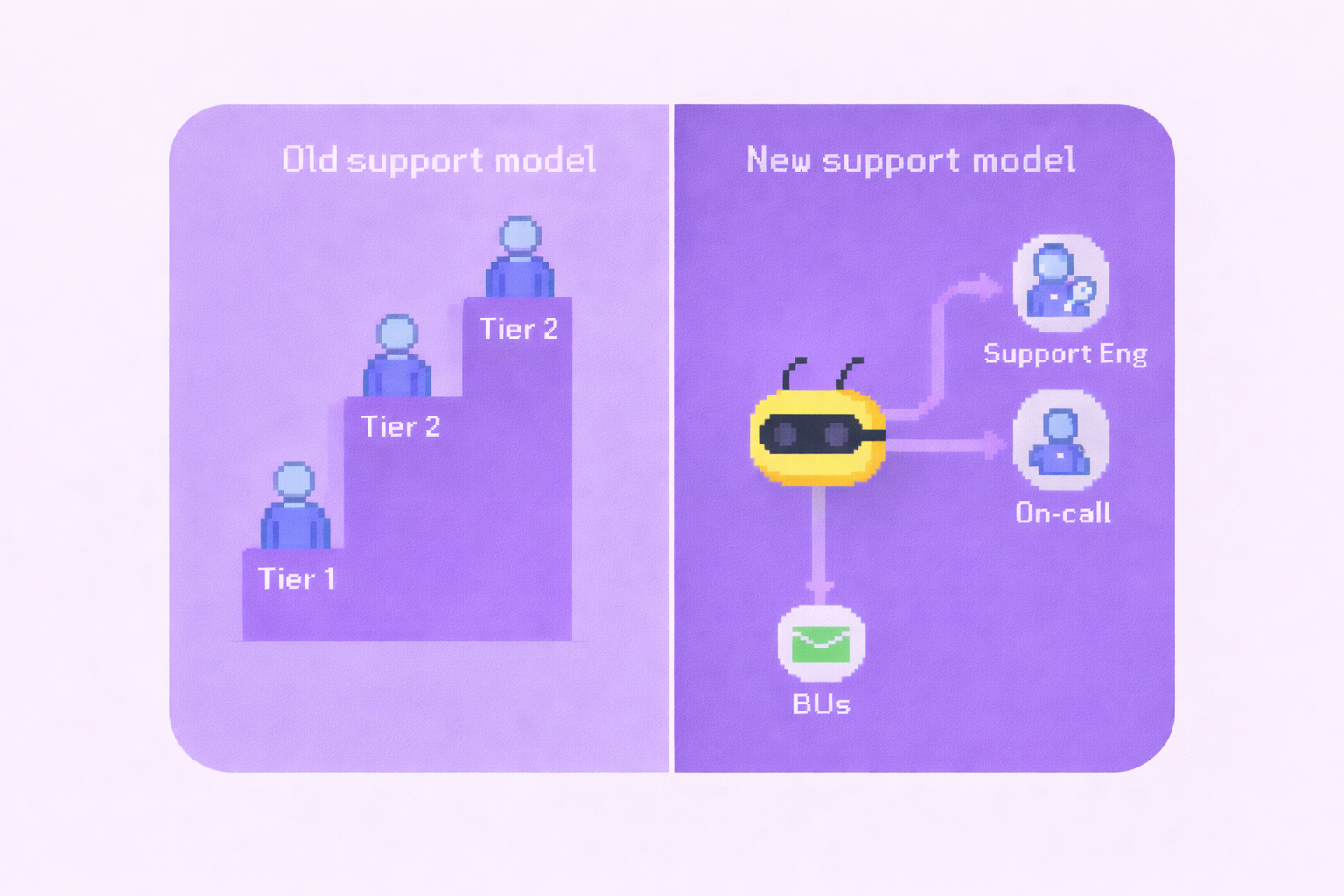How to Give Feedback to Your Boss

Giving feedback, in general, can be scary. Giving feedback to your boss? Terrifying. 👻
After all, they’re the person who holds the key to your growth and success at your organization. What if it’s not your place to give feedback? What if it backfires?
These are common concerns and part of the reason why feedback is often viewed as a one-way street reserved for managers to deliver to their direct reports. But in reality, to work together effectively as a team, it needs to go both ways.
There are certain times in the year, of course, when most organizations facilitate an upward feedback process. Think: 360 reviews. But to truly create a psychologically safe space, there needs to be a continuous, two-way feedback loop. Part of that means giving upward feedback, and doing it more than once or twice a year.
This article will focus on why you need to give feedback to your boss, how to approach these conversations, and five best practices for continuous upward feedback giving.
🎧 Watch on-demand: Going Beyond the Annual Review: Creating a Feedback-Friendly Company Culture
Why you should give feedback to your boss
You have a lot on your plate and the thought of giving feedback to your boss might seem like unnecessary stress—especially if you have a manager who doesn’t take feedback well.
So before we dive into tips on how to give feedback to your boss, let’s look at why it’s important to invest the time and effort, even when it seems intimidating.
It’s important to remember that your feedback is invaluable not only for your own happiness and productivity at work, but also for your manager. When you create a relationship where you feel comfortable giving one another feedback, it will help avoid future conflict and build a strong working relationship.
Avoid future conflict and work better as a team
Your boss isn’t a mind reader. If they’re doing something that’s making it harder to do your job, they likely don’t know.
In fact, managers are unaware of most challenges according to Sydney Yoshida’s Iceberg of Ignorance study. The study found that team managers only know about 9% of problems at a company.

In order for your manager to improve, they need to know the problem exists in the first place. And sometimes, it’s your job to surface problems that exist under the waterline.
The more issues you neglect to address, the more resentment will build, potentially spiraling into much bigger problems than they need to be. So while it seems hard in the moment, addressing issues as they come up will ultimately make them a lot easier to solve than if you let them fester.
Build a strong relationship based on trust
Trust: it’s at the core of every strong relationship. And giving feedback helps build a foundation of trust.
How, you ask?
At Hypercontext, we like to compare feedback giving to telling someone when they have lettuce in their teeth. We’ve all been in a situation where someone had food in their teeth, and we didn’t tell them. Despite understanding that telling them would be the right thing to do, it feels uncomfortable in the moment.
But telling someone when they have lettuce in their teeth means you have their back. While it might cause them slight embarrassment, it’s going to save them from a lot more embarrassment down the road.
That’s why we like to make the lettuce pact. The lettuce pact is an agreement you can make with your manager/direct report/colleague that if either of you has metaphorical (or literal) “lettuce” in your teeth, it’s your duty to tell each other. And even if you don’t go as far as making the pact, it’s a helpful concept to keep in mind.
While giving feedback can feel awkward, ultimately it helps build trust. The sentiment goes: I’m going to tell you if you have lettuce in your teeth and I trust that you’ll tell me too. After all, you and your boss are a team. It makes it easier to work together when you know you have each other’s backs.
It’s not all about the negative though! Upward positive feedback and recognition are equally as important. Your boss is a person trying to do their job, too, and everyone benefits from being recognized. Don’t forget to give your leader recognition when they do something great.
Want more? Check out 10 Dead Simple Ways to Improve Your Company Culture
There's a time and a place for upward feedback
While giving feedback is important, it shouldn’t come as a surprise that it needs to be approached delicately—no matter if it’s being given upwards, downwards, or laterally.
How you approach giving upward feedback is largely dependent on your relationship with your manager, the general culture of your organization, and what tools your company has in place to facilitate feedback. For example, do you have a platform for feedback giving? How often are your performance reviews?
But, in general, it’s best to give constructive feedback privately in your one-on-one meetings.
The best approach is to praise in public, critique in private.
For example, If your boss is explaining something to the team and they say something that bothers you, your team meeting isn’t the time to speak up. Pull them aside after or address it in your one-on-one so that you don’t embarrass them. Embarrassing or ostracizing someone is the quickest way to a defensive response.
For positive recognition, on the other hand, there’s more freedom. You can give them a shout-out in the team meeting, over Slack, or through a recognition platform like Bonusly!
5 tips for giving feedback to your manager
Here are a few tips to help give constructive feedback to your boss in a way that’s, well, constructive.
1. Assume positive intent
If your manager’s doing something that’s causing problems, they’re likely unaware of it. Go in with the assumption that they’re not doing anything maliciously.
Approaching the situation with this mindset will help you stay calm when giving feedback and approach it in a non-accusatory way. It’ll also help them understand that your feedback is coming from a place of wanting them to succeed rather than trying to bring them down.
Organizational Psychologist Adam Grant recommends opening your feedback with a statement indicating why you’re bringing it up. For example, “I’m giving you these comments because I think they’ll help improve how we work together moving forward.”
This helps set the tone for the conversation and ease any defensiveness.
2. Be specific
It’s important to be specific when giving both positive and negative feedback.
Sometimes, in an effort to be nice, we beat around the bush. But you’re not doing your manager or yourself any favors by being general with your feedback. The more specific you are, the more clearly they’ll be able to see the problem and course-correct.
Here’s an example of feedback that’s too general:
“You’re putting too much on my plate.”
Instead, try:
“I can’t take on X project because I’m currently working on Y and Z. I’m at capacity. I’d be happy to work on it if I can get support on Y or Z. Would that be possible?”
The same goes for positive feedback: when your manager understands specifically what they’re doing well, positive feedback will reinforce that behavior.
3. Propose a solution
Your boss likely has a lot on their plate. Make your feedback less stressful by proposing a solution. Even if it’s not a solution that’s ultimately used, it demonstrates that you’re proactive and eager to work with them to remedy the situation.
For example, if you feel like you’re not getting enough face time with your manager, instead of just saying that, propose you have recurring touchpoints on a weekly basis to help you stay consistently aligned.
4. Don't wait!
Giving feedback to your boss can seem stressful. As a result, it’s easy to procrastinate. But the longer you leave it, the harder it’ll be.
Why? Because humans forget quickly. If you address something with your boss that happened the prior week, they likely won’t remember it. Addressing situations while they’re fresh will make it easier for you and them.
5. Save constructive feedback for one-on-ones
Like we said earlier, constructive feedback should be done privately.
Having consistent one-on-ones with your manager is a great time to address any feedback. But don’t blindside them. Add what you want to talk about to your meeting agenda or meeting description so they know feedback is coming.
If you don’t already have one-on-ones, try scheduling a recurring touchpoint with your boss. They may not realize you want one.
Putting it into action
Giving upward feedback can feel precarious. But it’s also essential to creating a positive and safe work environment.
For those who are currently working in environments that aren’t conducive to feedback giving, we see you! Both parties need to be open to feedback in order for this to work—it’s a two-way street. Unfortunately, that’s not always the case. It’s part of the reason why so many employees are quitting their jobs.
To set yourself up for success, try implementing these tips the next time you need to have a difficult conversation with your manager.
Big thanks to our friends at Hypercontext who wrote this piece!
Need more ideas on how to improve employee engagement? Check out this resource:







